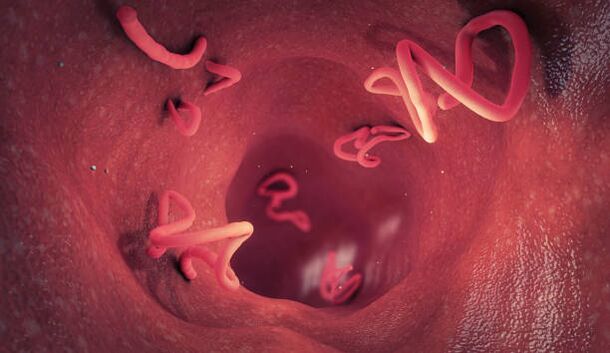Worms are parasitic worms that live in the body of a host - human. Age does not matter. Both adults and children are equally susceptible to infection. The classification of helminths is very broad, especially in countries with hot climates.

There are 3 classes of parasitic worms:
- round (roundworm) - pinworm, roundworm;
- tapeworms (cestodes) - pork tapeworms, beef tapeworms, echinococcus;
- flatworms, flukes (flukes).
The most common type of worm in children is the pinworm, which causes intestinal worm disease. These helminths are small, averaging 1 cm, gray-white in color with a curved body. The home of these parasites is the large intestine, but they can also invade the lower parts of the small intestine. Pinworms breed on the skin near the anus. At night, female pinworms come out to lay eggs in the folds of the skin, often entering the labia of girls, ending with infectious diseases of the genitals. In total, these helminths live for about 1-1. 5 months. The process of self-infection in children can lead to discomfort that will continue for many years. Parasites can be detected with the naked eye in feces.
Roundworm is another type of worm that is most common in children. Species-specific, reaching up to 15 cm in length, these roundworms settle in the lumen of the small intestinal loops, moving toward the moving mass of food. Roundworms in feces are very rare. Females lay eggs periodically, this can be found during stool analysis. But if during the study they were not found, this does not mean that the child is not infected. The life cycle of roundworms can last several years.
The reasons
Children's curiosity is realized through their fingers, when children learn about the world, they will actively touch everything under their arms and immediately put them in their mouths, trying to find strength and taste. Thus, the pinworm eggs safely enter the gastrointestinal tract of the future tiny host.
A child acquires worm eggs from unwashed fruit surfaces when drinking contaminated water. Very often, infection occurs when interacting with animals, or when playing in the ground, sand pits, where dogs and cats like to solve their physiological problems. After going for a walk, children often do not wash their hands, and all the dirt and eggs get into their mouths.
The symptoms
If a child has been infected with a large number of parasitic worm eggs, exhaustion can occur in a few days. In milder cases, the first invasive symptoms appear after several weeks, even months. Much depends on the immunity of the child. He is able to cope well with parasites and limit their development. But gradually the defenses are reduced, helminths enter the body causing many serious problems.
The first signs are symptoms of poisoning (intoxication). The vital activity of worms is accompanied by the release of a large number of animal toxins that can poison the child's body. In the intestines, parasitic worms use nutrients, so the baby gradually lacks protein, carbohydrates, fats and vitamins.
The child has:
- emaciate,
- pallor of the skin,
- weakness, frequent dizziness,
- increased body temperature, headache,
- nightmare,
- tear,
- depressed mood.
Intestinal diseases are manifested - constipation, loose stools, gnawing and pain in the abdomen, nausea and vomiting, painful sensations in different parts of the abdomen and flatulence. The disease may be accompanied by allergic conditions: itching, rash, cough, inflammation of the respiratory tract mucosa. Weakened immunity leads to more infectious diseases.
Diagnosis and treatment
Diagnosing helminths in stool is quite difficult. This is because ascaris or pinworm eggs do not appear in the stool every day, and the smear technique from the analysis requires great care. To increase the reliability of faecal analysis for worm eggs, it is recommended to conduct at least 3 consecutive days.
In cases of increased risk of worm infection (contact with animals, children playing on the ground or in exposed sandpits, habit of putting objects in the mouth, biting nails or licking fingers, etc. )That is, an in-depth examination should be carried out, which includes, in addition to a triplicate analysis of the stool, a blood test that specifically detects antibodies to helminths.
In the case of allergic manifestations of unknown origin, increased eosinophil counts on blood tests, persistent dysbacteriosis, blood donation is recommended for the determination of type E immunoglobulins. Ig E and G) for roundworms and other helminths. . You can check for worms in pets.
Assessing the totality of indirect signs and medical history, the physician may recommend deworming therapy without direct evidence of the presence of worms in the child, if other causes of the disease are excluded. Similar clinical manifestations of all family members to avoid forming the focus of infection with each other by helminth eggs. Facing that situation, it is necessary to strengthen hygiene measures, namely boiling, flat ironing of beds and individual bed linen on both sides.























